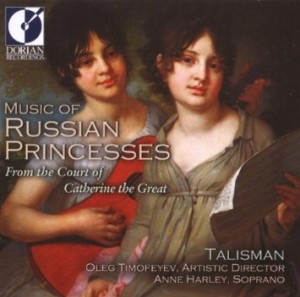 When one hears the phrase “Russian Classical Music”, one thinks perhaps of the ballets of Tchaikovsky with their searing drama and heartbreaking grace. One thinks of the piano concertos of Rachmaninov, with their wondrous lyricism and blazing virtuosic demands on the soloist. Maybe one thinks of Stravinsky, with his modern sound world that still shocks a hundred years later. Perhaps one considers the bleak emotional landscape of the great Soviet-era composers, Shostakovich and Prokofiev. But whatever comes to mind at the phrase “Russian Classical Music,” it is certain that it is music composed after 1850, when classical music was in the full throes of the Romantic era and when nationalism was rising as a force in music. One would certainly not consider Russian music from the Classical or Baroque eras.
When one hears the phrase “Russian Classical Music”, one thinks perhaps of the ballets of Tchaikovsky with their searing drama and heartbreaking grace. One thinks of the piano concertos of Rachmaninov, with their wondrous lyricism and blazing virtuosic demands on the soloist. Maybe one thinks of Stravinsky, with his modern sound world that still shocks a hundred years later. Perhaps one considers the bleak emotional landscape of the great Soviet-era composers, Shostakovich and Prokofiev. But whatever comes to mind at the phrase “Russian Classical Music,” it is certain that it is music composed after 1850, when classical music was in the full throes of the Romantic era and when nationalism was rising as a force in music. One would certainly not consider Russian music from the Classical or Baroque eras.
A performing group named Talisman is working to change that.
Formed in 2000 by soprano Anne Harley and guitarist Oleg Timofeyev (who is noted for his expertise in the Russian guitar tradition), Talisman is dedicated to the performance and promotion of music from Russia’s little-known Baroque and Classical era, roughly 1750-1850.
In writing the first paragraph above, I’m partly talking about myself. I knew nothing about this era of Russian music when this CD arrived on my desk, and now I have to wonder why. It is surely a matter of historical reality. The music here may have been composed in Russia, and some of the music uses Russian instruments such as the Russian guitar (a seven-stringed instrument), but the music follows the standard formal conventions of the day: French romances, Italian songs, and the like. Until nationalism rose and Russian composers began to look to their nation’s own folk tunes and language for inspiration, Russia’s musical tradition was an imported one. This probably explains the lack of familiarity today with this era of Russian music: it was a relative backwater, where the progress of form and tonality was not being pushed as much as in Paris and Vienna. But that which is ignored for not being as innovative or significant historically is often also ignored unjustly. The music contained on this disc is charming, competent, and most importantly, beautiful music in the late Baroque/early Classical vein.
And it’s all the more remarkable because all of the selections are by women.
This is probably one of those happy historical accidents. Surely women of the compositional talent represented here would not have found encouragement to write their music or publish it, and under their own names, if not for the reign of Catherine the Great (1729-1796, reigning from 1762). It would have been very unlikely for the women to have this opportunity, if not for an Empress who was also a great patron of the arts in Russia. Then we would not have the present album. Music of Russian Princesses is exactly that: music written by the Princesses and countesses of Catherine the Great’s court.
All of the selections on this CD are well-performed, with both technical proficiency and gusto befitting music written for an Empress’s court. The music of Princess Natalia Ivanovna de Kourakine is directly represented by four of the fourteen selections, with a fifth being a set of variations on a theme of Princess Kourakine’s by a little-known composer named Ludwig Wilhelm Tepper von Ferguson. I found Princess Kourakine’s selections to generally be the best on the disc, but all of the music here is of excellent quality, representing as it does an almost completely unexplored tradition. All of the music involves either harpsichord, guitar, or violin, sometimes in combination and usually with soprano voice, with a sprightly Polonaise for harpsichord by Catherine de Licoschin opening the disc in robust fashion and setting the stage for a festive recording. Classical listeners seeking something new amidst the old should all check out this CD.
The liner notes are also excellent, giving a great deal of background historical information on the composers and the setting in which they worked to produce their music. All in all, an excellent package.
(Dorian Records, 2001)
